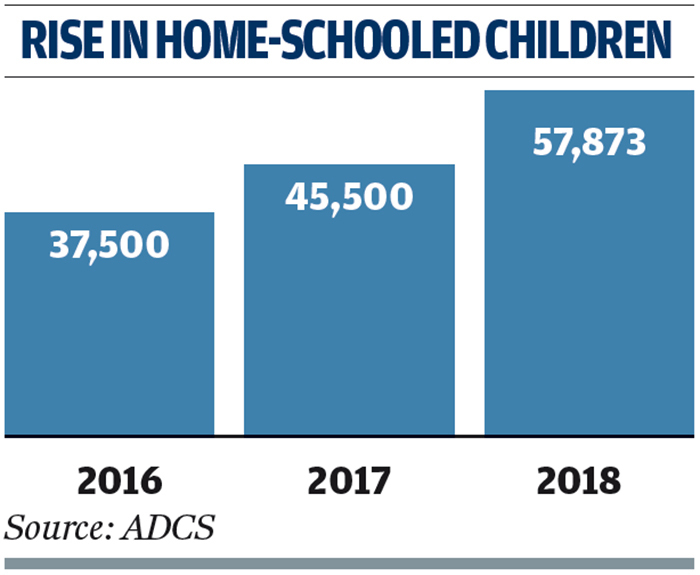Home schooling survey reveals rising concerns over 'off-rolling'
Derren Hayes
Tuesday, November 27, 2018
The latest elective home education (EHE) survey by the Association of Directors of Children's Services (ADCS) reveals the number of children being taught at home rose by more than a quarter this year.

The ADCS data, based on responses from 106 local authorities, shows that on the final day of the 2017/18 academic year, 40,359 children were home educated. Extrapolated across all 152 councils, there were 57,873 home-educated children in England in 2018, a rise of 27 per cent on 2017's total, which itself was 21 per cent higher than in 2016.
The report attributes the rise to a number of possible factors, including improved reporting practices by schools and better communication between councils and other public agencies aiding identification of children.
Many of the respondents suspected the actual number of children being home schooled is higher than the figures suggest, because there are no legal requirements for parents to report home education arrangements.
The survey shows the most common reason for children to be home schooled are health issues and dissatisfaction with school. However, respondents also highlighted a rise in the use of elective home education to avoid exclusion, penalty notice fines or stressful issues.

Rise of off-rolling
This chimes with findings from a recent education select committee inquiry into exclusions that highlighted the rise of "off-rolling" - where parents are encouraged by schools to home-educate children whose behaviour or academic performance causes concern.
The ADCS report cites one respondent saying: "Some parents are pressured into having to ‘choose' EHE as a way of instantly removing their child from a stressful school environment. School attendance officers/welfare officers are offering a way out by suggesting immediate removal can be achieved if they choose to say they are home educating and they can then look to apply for another school. This results in children being out of education for a time, interrupting their schooling."
Another says: "We are concerned by parental reports that some schools appear to pressure or cajole parents to de-register for EHE in the face of low attendance, poor academic progress or risk of exclusion."
Around nine out of 10 authorities said they request a home visit or meeting to discuss parents' home education plans. Other councils said they only request a home visit when there are concerns that provision may be unsuitable or over safeguarding - 11 per cent of children were "known" to children's social care services. The average take-up rate of home visits was 72 per cent, while 36 per cent of families provided evidence of education in lieu of a visit.
In addition, half of authorities were aware of unregistered tuition centres operating in their area, and 11.5 per cent knew of unregistered schools operating illegally. Some respondents highlighted growing concerns about tuition centres and the fact that councils have "no duty to quality assure the practice or safeguarding of any private offer".
Lack of powers
Children's services leaders have raised concerns about the lack of powers they have over EHE.
Writing on the ADCS website this year, Gail Hopper, director of children's services in Rochdale, said: "I certainly don't know if the current EHE children I know of in my area all receive a good standard of education at home. Current legislation doesn't support me in trying to find this out. This is one of the things that keeps me up at night and doesn't fit with my statutory duty as a director."
She was writing after the launch of a DfE consultation on draft EHE guidance. The consultation, which closed in July, called for views on whether a national register of children educated at home should be set up, if monitoring of EHE arrangements are needed and what support should be put in place for home educators.
Children's services leaders will be hoping the government acts on their concerns.




